
– 12-05-2024-
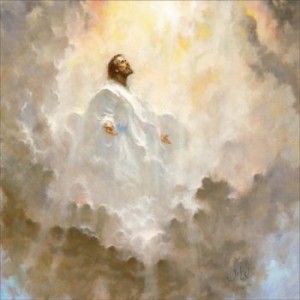

vs.14a Jesus showed himself to the Eleven
 vs.15 and said to them,
vs.15 and said to them,
“Go out to the whole world; proclaim the Good News to all creation.
vs.16 He who believes and is baptised will be saved; he who does not believe will be condemned.
vs.17 These are the signs that will be associated with believers: in my name they will cast out devils; they will have the gift of tongues;
vs.18 they will pick up snakes in their hands, and be unharmed should they drink poison; they will lay their hands on the sick, who will recover.”
vs.19 And so the Lord Jesus, after he had spoken to them, was taken up into heaven: there at the right hand of God he took his place,
vs.20 while they, going out, preached everywhere, the Lord working with them and confirming the word by the signs that accompanied it.
******************************************
We have four commentators available from whom you may wish to choose . Click on the name of the commentator required.
****************************************
Michel DeVerteuil
Lectio Divina with the Sunday Gospels
www.columba.ie
General Textual Comments
At the beginning of today’s passage we are reminded that these words were once spoken by Jesus himself to some disciples who were facing a difficult time. They felt very disorganized and lost; here now was Jesus standing before them and giving them a way to go forward.
He continues to do this for us today through different “messengers” whom God sends to us. We must be aware of them and thank God for them. Jesus makes a first crucial statement to his followers: they are to “go out into the whole world and proclaim the Good News to all creation”. We think today of many parts of creation where the gospel of Jesus has not yet been preached.
We think of signs in the modern world which we can associate with true believers:
– “In my name they will cast out devils.” Many people in our modern world think that no one cares for them, not even God. True believers, however, speak in words which convey that gifts like true selflessness can bring help for all.
– “They will have the gift of tongues.” There are people in the world today who cannot speak in new languages; they use words that cannot touch unyielding hearts. True believers however will be able to communicate their message of love to all they meet, no matter what their original circumstances were.
– There are people who can act out their role as evangelisers, even in what seems to the rest of us as very difficult circumstances. They venture into difficult worlds. They work in difficult surroundings, among prostitutes, drug addicts and other outcasts of society. They can “pick up snakes in their hands and be untouched by them”. We can say about them that, “they will remain unharmed even when they drink deadly poison.”
– Finally, Jesus tells us that “true believers” can “lay their hands on the sick who will recover.” There are people who can lay their hands on those who are sick and see them recover before their very eyes. It is truly a wonderful experience of God’s salvation and “true believers” can feel it happening.
The passage concludes with a beautiful saying about the Lord Jesus. It is said of him that “he was taken up to heaven” and that “at the right hand of God, he took his place.” We who believe can now think of the Lord Jesus sitting at the right hand of God. We are in this world surrounded by all our difficulties and yet we feel great trust in the Lord.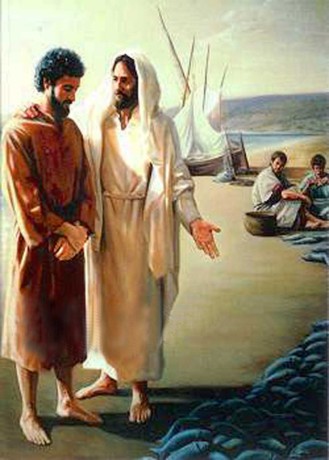
“They, going out, preached everywhere and the Lord is working with them and confirming the word by the signs that accompanied it.” As believers, we know well that the Lord is with us. He is confirming what we say by the signs he has sent to accompany us, and the great miracles he achieves through us.
Prayer Reflection
“In the Church’s history, missionary drive has always been a sign of vitality, just as its lessening is a sign of a crisis of faith.” …John Paul II, Encyclical Redemptoris Missio, 1991
Lord, there comes a time in life when we know
that what we believe in is good news for the whole of creation.
We feel like the apostles when they met Jesus after his resurrection.
It is strange, but the conviction always seems to come after we have experienced a setback,
some of our members may have deserted us as Judas deserted Jesus.
Yet we know we must go out to the whole world.
Our cause is with you, as safe as Jesus taken up to heaven and taking his place at your right hand, so that we can go out, preaching everywhere, our words confirmed by the signs which accompany them.
Lord, there are certain signs that are the mark of true believers.
Demons have been causing havoc in our community and no one has been able to confront them – a person of faith will cast them out in one moment.
Believers can express an old message in a totally new way, so that people who have been listening to that message for years will suddenly become convinced.
The rest of us are afraid of going into places for fear we might be corrupted: believers do it and remain totally unharmed.
They can enter into discussion with enemies of the faith and remain calm and loving.
They go to someone whom the community has written off as a hopeless case
and at the touch of their hands this person returns to normal living.
Lord, we thank you for believers.
“Anyone who loves his life loses it; anyone who hates his life in this world
will keep it for the eternal life.” ..John 12:25
Lord, it is clearly a law of life that we must eventually commit ourselves
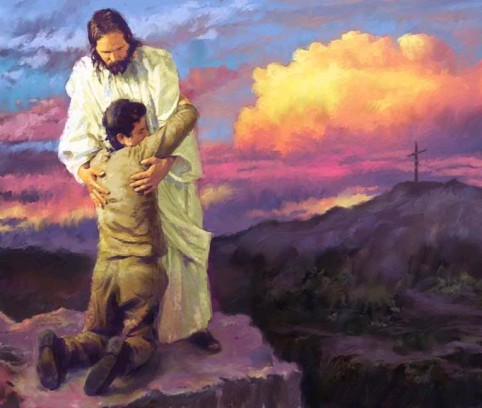 *to marriage,
*to marriage,
*to a noble cause,
*to the following of Jesus.
We must take the risk.
If we hold back, afraid of this baptism,
we are condemned to lives of mediocrity.
To go forward in faith is the only way to be saved.
“On the day that the children of Israel crossed the Red Sea so miraculously, God was surrounded by angels . They noticed that God was crying.
Are you not glad?’ they asked.
‘How can I rejoice?‘ God asked. ‘My children are also drowning.’”
A Jewish legend by Rabbi Hugo Gryn at a vigil for the Gulf War, London 1991
Lord, forgive us that we set limits to your love. Remind us that the good news you revealed to us is to be proclaimed to all creation.
Lord, so often as a Church we give people the idea that following Jesus can be done with minor adjustments to their lifestyle.
Help us to teach plainly, like Jesus, that being disciples means taking enormous risks of being drowned,
but unless we are baptised in him, he cannot save us.
“This is the end of the Chinese people’s adolescence, and their initiation into political maturity. They are no longer waiting to be liberated; they are now ready to pay the price to liberate themselves.” …Liu Binyan, dissident Chinese journalist
Lord, we thank you for people and cultures
who have been through crucifixion experiences
and have emerged with their faith and their courage intact.
We pray that like the apostles at the ascension of Jesus
they may now go out into the whole world
and announce with confidence the good news
that the human spirit cannot be enclosed in a tomb and will always rise again.
***********************************
Thomas O’Loughlin
Liturgical Resources for the Year of Matthew
www.columba.ie
Introduction to the Celebration
 There is an air of finality about today’s festival. Our focus is on the retelling of a story declaring that Christ has returned to the Father, and so we think of it as the ‘end‘ of the Christ event or the ‘end of Easter‘ – in times past there was a custom of extinguishing the Paschal Candle after the gospel to signify: ‘he is gone‘.
There is an air of finality about today’s festival. Our focus is on the retelling of a story declaring that Christ has returned to the Father, and so we think of it as the ‘end‘ of the Christ event or the ‘end of Easter‘ – in times past there was a custom of extinguishing the Paschal Candle after the gospel to signify: ‘he is gone‘.
But the air of finality must be presented in a different way – it is not the final song to mark the sorry close of a party, but the joyous finality of a building job completed: Christ’s presence is no longer limited to a small group in one place at a particular time, now his presence is diffused throughout creation through his body the church. It is this mystery of Christ’s presence we celebrate today: we are not here to recall some ‘event‘ that ‘happened‘ on some fixed day in human historical time.
Ascension is not about Christ’s absence, but about his presence in a different way to that which he had before his death. He now is present in our community, and as a group we must make him present by testifying to him before the world as the community of justice, peace and love.
General Comments on Gospel: Mk 16:15-20
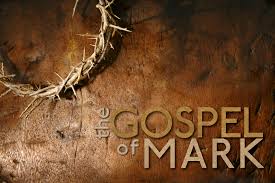 Here we have the conclusion of Mark’s gospel as that gospel is commonly found in printed editions, and so it adds to the tone of finality that can pervade the liturgy today. Moreover, it seems to accord well with the theme, with its challenge from Jesus to them to proclaim the Good News to all creation, and that having said that he was taken up into heaven. However, we are dealing here with the famous ‘last eleven verses’ (16:9-20) which did not originally belong to this gospel and are a later conflation from Matthew and Luke added to Mark, as 16:8 seemed too stark an ending for a gospel.
Here we have the conclusion of Mark’s gospel as that gospel is commonly found in printed editions, and so it adds to the tone of finality that can pervade the liturgy today. Moreover, it seems to accord well with the theme, with its challenge from Jesus to them to proclaim the Good News to all creation, and that having said that he was taken up into heaven. However, we are dealing here with the famous ‘last eleven verses’ (16:9-20) which did not originally belong to this gospel and are a later conflation from Matthew and Luke added to Mark, as 16:8 seemed too stark an ending for a gospel.
Indeed, apart for the traditional ending, which we read today, there are several other endings extant. But the fact that sometime in the second century (possibly before Justin’s time, (died c. 165) and certainly prior to Irenaeus, (died c. 202) this ending was added, is crucial for our understanding of this feast: it is the mystery of ascension that that community felt had to be included in any account it would receive of the Christ-event. They saw and celebrated that event as one where they were the continuation of the work of the Christ: they were being upheld by his presence so that not only was he at the right hand of the Father’ but with them in their trials protecting them. And if Christ was with them, they were going everywhere preaching and making him present.
So, in the three readings we have three different ways of viewing this early Christian belief in their on-going life in Christ. All three assume that this is something that animates the community, and are incomprehensible in their imagery of Christ in the heavens unless that mystery was already part of their liturgical life prior to these writings.
Homily notes
1. Today’s feast celebrates our belief in the presence of Christ in the universe and sets it in a tension with the demand that we then be the vehicles by which that presence is made manifest. It is his presence in us that makes the demands of disciple-ship upon us that we must proclaim him. The mystery of Ascension is that his presence with us and our witness to him cannot be separated.
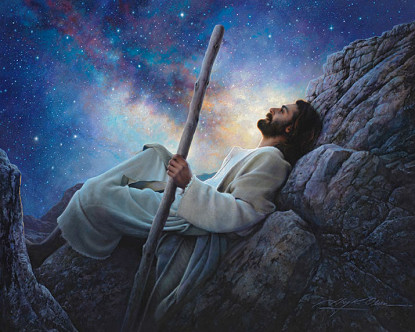
2. But do we take his presence in the universe seriously? Do we believe he is present in every poor person, every sick person, every prisoner? Mt 25:34-46 can be read as the ‘other side‘ of this mystery: in today’s texts we think of the beginning of the ascended presence of Christ in the church; in Mt 25 we have a reflection on the eschaton and when that presence in the disciples ceases.
3. Do we take seriously the notion that there is no area of the universe from which Christ’s presence is excluded? So Christ is present in every creature (see Jn 1:3) and in every aspect of human life. But there are powerful forces that would want to silence those who preach concern for the environment or, at least, argue that ecology is not something with which the church should concern itself. Or in the human universe, there are many who see Christian concerns in politics, economics or medicine as meddling and would like to limit church concerns to ‘Jesus and religious matters’. But this feast is our proclamation that Christ is now to be found everywhere as the risen one forming a kingdom for his Father, and so in every area of existence his followers must be witnessing to him. In rising from the dead, the whole creation has been transformed and is a ‘religious matter’.
4. ‘To be witnesses’ (manures) and ‘proclaim’ (kiruxate) were key terms for the early church: one was descriptive of what they must be, the other a command as to what they must do. But, by the second century, both were very expensive words. A misty sweet image of Jesus floating away, alongside an arcane discussion about ‘whether you can trust “the bible”‘ in its creative poetic narratives such as Acts 1, fails to do justice to this mystery on both counts.
***********************************
Sean Goan
Let the reader understand
www.columba.ie
Gospel: Mark 16:15-20
These remarkable verses are taken from what is sometimes called the longer ending of Mark’s gospel and they represent a final summary explanation of the meaning of Jesus’ life, death and resurrection. Mark offers no description of the ascension of the Lord but sees the whole mystery in the light of Easter. It is the good news that all who respond to Jesus in faith are saved and the power of the risen Christ will be with the church to ensure the success of its mission. The signs that are mentioned are not to be taken literally but show that, in Jesus, good triumphs and evil is defeated. The affirmation that those who do not believe will be condemned is not understood by the church as saying that only Christians will get into heaven. Rather it is a warning about those who wilfully refuse to respond to God at work in their life. Christians are always asked to leave judgement to God.
Reflection
It is a temptation for every generation of Christians to stand looking up to heaven and wringing their hands wishing that Jesus walked our streets as he did the streets of Palestine or that he would come back in some dramatic way to show the world the error of its ways. However, such an attitude entirely fails to appreciate the dignity of our calling. We have been entrusted with a task and today’s feast is a reminder to us that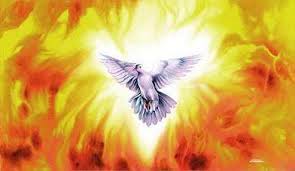 Jesus only left this world so that he could be with us in a more effective way.
Jesus only left this world so that he could be with us in a more effective way.
So, in the coming week let us pray with urgency for a renewed outpouring of the Spirit so that we can become more effective witnesses of his love.
***************************************
Donal Neary SJ
Gospel Reflections
www.messenger.ie/bookshop
Going Out or Going Up?
The feast of the Ascension seems to be more about the apostles going out than Jesus going up! As Jesus goes to his Father, the message is for us now, and to be witnesses to him, sharing what we have received, and heard.
Witnesses to a road accident can often contradict each other. They get mixed up in what they saw or heard. Or they may have only glanced at the event and moved on. We can be witnesses of Jesus who stayed with the event, not just with a glance. We have seen and heard the best story ever told, and the most influential life ever lived.
We witness to Jesus
in prayer,
in reading the gospel and
in service of others in love.
Prayer means being in touch with God who is reaching out to us. The gospel is what feeds us, a daily opening to the words and deeds of Jesus. Loving service brings us to witness the care of God as we give and receive care.
This is what we give to the ascended Lord and receive from him. The word of God is the divine word in human words. In our work for him, God is linking heaven and earth, and we are sharers in his divinity as he is in our humanity. Far from being the absence of Jesus, the Ascension is his presence in a new way among us.
Looking up is a religious gesture.
Look up to the skies sometimes this week and make a favourite prayer.
Lord, may your kingdom come!
*****************************